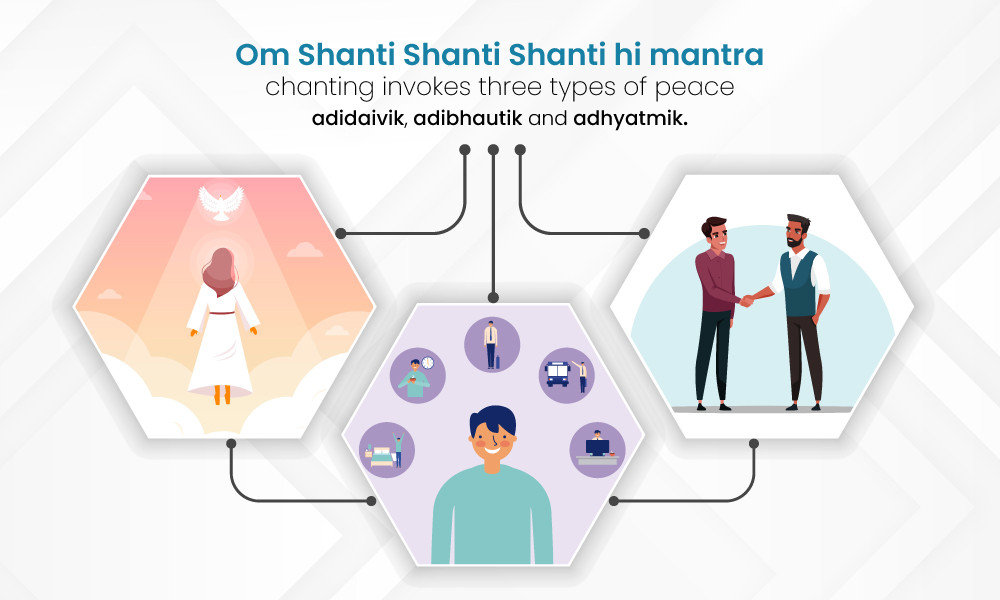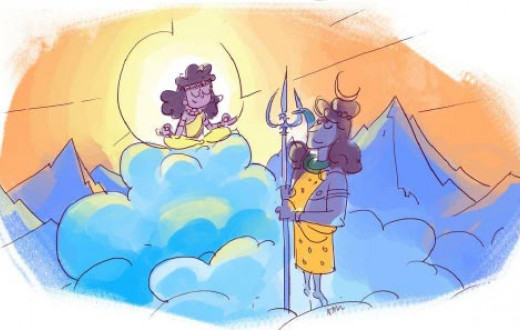ॐ सह नाववतु ।
सह नौ भुनक्तु ।
सह वीर्यं करवावहै ।
तेजस्वि नावधीतमस्तु मा विद्विषावहै ।
ॐ शान्तिः शान्तिः शान्तिः ॥
Om Saha Nau-Avatu | Saha Nau Bhunaktu | Saha Viiryam Karavaavahai | Tejasvi Nau-Adhiitam-Astu Maa Vidvissaavahai | Om Shaantih Shaantih Shaantih ||
Most of us have been familiar with this and other Shanti mantras from our school days. There are innumerable such mantras in our scriptures, seeking and praying for peace. Perhaps we all know the English word for ‘Shanti’ is peace. Peace is one of the major human values. Peace represents innumerable other values such as harmony, equanimity, silence, non-violence, amity, calmness and tranquility.
Why is Shanti chanted thrice?
Usually, we have heard ‘Shanti’ being chanted thrice at the end of our prayers. Have you ever wondered why Shanti is chanted three times? What is the meaning of Shanti? Do you wish to know the significance?

Let us now go in-depth to understand the reasons for requesting peace in this way.
Shanti is chanted thrice not for emphasis but because the three types of miseries experienced in the three realms of existence seek peace.
Adhibhautik - relates to the materialist realm. We perform routine actions in this realm like eating, drinking, or doing Seva. But disturbances arise from the world around us like mosquitoes, chaotic neighbors, sarcastic comments and family arguments. We can have some control over these disturbances but not in totality. So we pray to the almighty to protect us from them.
Adhidaivik - relates to the celestial beings or nature. Nature has provided us with everything to survive and thrive on the earth. But there are miseries caused by nature like hurricanes, tsunamis, fires, typhoons, earthquakes, volcanic eruptions, floods and famines. We cannot control them. Thus, we seek peace from the almighty to protect us from the disturbances beyond our control.
Adhyatmik - relates to the spiritual realm. It gives you an experience of fulfillment in the other two realms. The mental state of an individual in thoughts, words and action comprises the Adhyatmik realm like sincerity, cooperation, and friendliness. Identifying with the ego, the people, places, and worldly things stimulate either attachment or aversion. Lust, jealousy, anger, sorrow, and hatred can destroy our peace. Thus, praying to the almighty to seek peace on the spiritual path or the inner obstacles, the third ‘Shanti’ is chanted.
The chanting of the peace mantra says ‘Shanti’ thrice means peace and contentment in all three realms. The mantra helps you in progressing on this path. It also means inner peace, peace in the world and in the soul.
Spirituality is not loud noise. It is a whisper. Hence, you might notice that the third time we chant ‘Shanti’ softly. It is the most important one because even if we are free from outside miseries if the inner realm is not calm, we will never experience peace. Conversely, once we have found inner peace, no external disturbances can bother us.
A witty answer by Gurudev Sri Sri Ravi Shankar about the meaning of ‘Shanti’: We must make you sit in a small closed room and play loudspeaker 24 hours. Not some good music, but some heavy music. Then after 24 hrs, when we switch it off, you will come to know what is 'Shanti'. (Laughter!!!)
Gurudev highlights how Mantras can reduce the effect of time on the mind. Visit our blog to read more.
What are the benefits of chanting ‘Shanti’ thrice?
Many advantages of chanting ‘Shanti’ are inexpressible. A few benefits are here.

The Om Shanti Shanti Shanti mantra increases the life force energy or prana.
It activates the healing mechanism of the body.
It is a powerful tool to get relief from tension and attain a meditative state of mind.
Summation
The devotees pray to the almighty to free them from all the hindrances and conflicts.
Inspired by Gurudev Sri Sri Ravi Shankar’s wisdom talks
Written by: Pratibha Sharma
Reference link
Ishavasya Upanishad - Discourse by Gurudev Sri Sri Ravi Shankar
FAQs
The ‘Shanti’ mantra is to wish for peace of the body, mind and soul at the start or end of the day, auspicious occasions like a birth ceremony, marriage, and housewarming. Or any time of the day.
Upanishad means the disciple (seeker) sitting close (physically and mentally) to the master for knowledge. Om Shanti Shanti Shanti hi mantra chanting invokes three types of peace adidaivik, adibhautik and adhyatmik.
Our consciousness is timeless. Mantras generate vibrations in our bodies. By mantra chanting in the ancient tunes, the depth of consciousness is affected by its vibrations. Thereby, reciting the mantras in the specific intonation is beneficial.



















